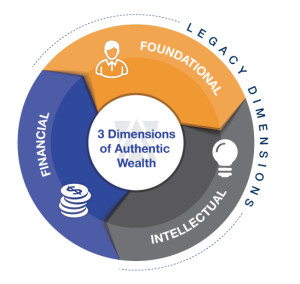Imagine you had $1 million, right now, to spend on whatever you want. What would you buy with it? Houses, cars, jewelry, property, lavish vacations, fine art? What if it were $10 million? Or $10 billion? The things you could do, right?!
But there’s one thing you couldn’t buy, no matter how limitless the dollars: happiness. “Money doesn’t buy happiness” is not just an adage to me. I have met many multi-millionaires—people who have created tremendous amounts of financial wealth—and yet many of them are not satisfied. They don’t experience much joy. Why? They are bankrupt in other areas in their lives.

My wife and I volunteer to mentor youth at detention centers, boys’ and girls’ group homes and crisis residential centers to help young people learn responsibility and accountability and envision a brighter future. These youth are in physical captivity. But many multi-millionaires are experiencing another kind of captivity—that which their financial wealth has caused.
In a nutshell, my perception is that many people think that happiness or peace will come with the accumulation of things. You can often recognize these people because they’re always talking about their things. And it doesn’t matter how many things they acquire—they’re still living in the scarcity zone, and it’s never enough.
But it’s not just money people try to look to for happiness. Others try to grasp it by looking to other people, whether it’s rock stars, athletes, movie stars, politicians or radio personalities. Their sense of happiness (or misery) seems to be dictated by what these people say or do.
Still other people are “thought worshippers.” Whether it’s the latest self-help tenets (which often tend to make people look inward, wondering why the world just isn’t making them happy enough) or it’s shallow quotes from trending gurus, they latch onto euphemisms that just don’t seem to last.
Rather than chase these things that have kept mankind hungry for true happiness for millennia, why not change course and invest in the things that will matter?
I often ask audiences when I speak, “If what you always thought to be true, turned out not to be true—when would you want to know?” Sooner than later, right? Well let’s flip the question: “If what you always thought not to be true, ended up being true, when would you want to know?”
My guess is: RIGHT now.
Here’s the key: Authentic Wealth is comprised of Three Dimensions of Authentic Wealth: Foundational, Intellectual and Financial. I describe these dimensions in detail in my book, Entitlement Abolition, but essentially, they’re the foundation of a balanced life of abundance. And as we learn how to weed out the habits of scarcity and embrace the habits of abundance, true happiness can enter in.
But remember, it’s not just about achieving abundance for ourselves. If we don’t capture and leave behind “how to fish” to our children and grandchildren, we will in essence be just “dumping” fish in their lap and actually enabling them with an entitlement mentality.
Just like when you throw a rock in a still pond and the ripple in the water extends to ever-widening circles of influence, what we choose to do in our lives can affect countless generations—for the better or worse. So I invite you to pursue abundance in all aspects of life, and send endless echoes of positive, responsible, accountable living to those you care about.
To get access to the introduction of our book Entitlement Abolition click here.